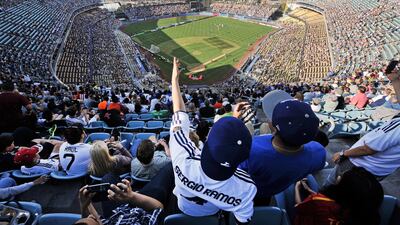Having paid nearly US$500 (Dh1,837) for a ticket to watch his team in a pre-season friendly against Barcelona, Manchester United fan Vikrom Ahuja could hardly contain his excitement.
"It's a lifetime opportunity because you're not going to see this kind of opposition in the US," Ahuja said as he savored the prospect of seeing Jose Mourinho's side take on the likes of Lionel Messi and Luis Suarez at a stadium in the suburbs of Washington.
"I don't support a local team because the way they play, it doesn't excite me, it doesn't get me out of my seat."
Domestic "soccer" has long struggled to draw big crowds in the United States, even though ticket prices often are significantly cheaper than for sports such as baseball or American football.
But huge attendance figures at a series of friendly matches involving the biggest teams in European football have underlined a decided American interest in the game - as long as the quality is top-notch.
Also read:
Etihad scores winner with US Major League Soccer
Win! reveals the inside story of MLS football team New York City FC
David Beckham on target for Major League Soccer goal
Tickets for Saturday night's match between Real Madrid and Barcelona at the 65,000-seat Hard Rock stadium have been selling for nearly $1,000 on the black market.
A match between Madrid and Manchester City drew a crowd of more than 90,000 in Los Angeles earlier in the week, while upwards of 82,000 fans watched Barcelona take on Italian giants Juventus just outside New York last weekend.
For years, Europe's top clubs tended to head to Asia in the close season in a bid to grow their fan base, but the United States appears to be increasingly the No 1 choice.
Watch Real Madrid following here:
Other teams to have toured the States this year include Paris Saint-Germain, Roma and Tottenham Hotspur - some them competing in the grandly titled International Champions Cup.
The matches give US-based fans a chance to watch their team's newest stars even before they make their debuts back home, such as United's new record signing of Romelu Lukaku.
Barcelona fans meanwhile got to see Brazilian star Neymar score the winner in what could turn out to be one of his last matches for the Catalan team if a much-touted move to PSG comes to fruition.
Also read: MLS foundation is in place for football to flourish in the United States
Eric Wesner, part of the 82,000-strong crowd at a stadium which is normally home to the NFL's Washington Redskins, said he had no regrets about paying $200 for a seat even if the venue is a good two-hour drive north of the capital.
"I paid 200 bucks after fees when I usually pay $30-$40 for DC United," he said in reference to the local MLS franchise who play at the centre of Washington and who get average crowds of around 16,000 per match.
"It's interesting because there are a lot of stars, and the level is much higher than the MLS."
Back in the 1970s, US fans did have the chance to watch the game's biggest names on a regular basis when the likes of Pele and George Best played in the now defunct North American Soccer League.
The MLS has managed to attract some big names in the autumn of their career such as France's Thierry Henry and England's Frank Lampard but struggles to compete with the likes of China and even India when it comes to wages.
On a ligher note: Schweinsteiger asked if he can help Chicago Fire win World Cup
But Laurent Dubois of North Carolina's Duke University, who has written a book which demystifies the game for Americans, was not surprised crowds had flocked to the pre-season friendlies.
"Soccer is of course overshadowed in the media by American football, basketball, and baseball and yet I think probably more people play soccer in this country than any other sport," Dubois told AFP.
Dubois was confident that it is only a matter of time for the MLS to build up its fan base and for those fans to go to see their hometown heroes, not just save up to watch foreign stars.
"There will be a problem for a while that many in the US will feel like the best soccer is being played elsewhere, and they would rather watch Chelsea or Barcelona than an MLS team.
"But the fan cultures for local teams will keep growing I think."

